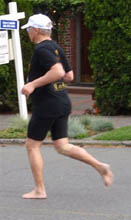What Is Barefoot Running?

Barefoot running is running while barefoot — without wearing any shoes on the feet. Running in thin-soled, flexible shoes such as moccasins is biomechanically similar, and often equated to barefoot running. Running in modern running shoes is quite different, and contrasted with barefoot running.
In early human history, barefoot running was widespread, but this became increasingly less so following the growth of footwear usage. Barefoot running is near non-existent in modern-day populations of industrialised and wealthier countries, although it remains relatively common in many poorer nations. In terms of competitive running, virtually all modern athletes use running shoes. However, a small minority of runners have achieved success running barefoot, including Olympic champions and world record holders Abebe Bikila and Tegla Loroupe, as well as Zola Budd. (Although Bikila won the Rome Olympic marathon barefoot in 1960 in 2:15:16, at the Tokyo Olympic marathon in 1964 he wore shoes and set a world record in 2:12:11.)
The human mechanics of running are changed quite significantly when shoes are used — with natural, shoeless human running, the balls of the feet are the part which strikes the ground with the most force. Running in padded shoes typically alters this as more emphasis is placed on the heel and the area towards the back of the foot.
Proponents, such as those identifying with the barefoot movement, argue that barefoot running is healthier for feet and reduces risk of chronic injuries, notably repetitive stress injuries due to the impact of heel striking in padded running shoes, in addition to other purported benefits. These health claims of barefoot running are supported by some research and advocated by some authorities, but the research is not conclusive or widely accepted in the medical community. Barefoot running is not generally advocated by medical or sports organizations, who, in the main, recommend that suitable padded running shoes be worn, with particular consideration to foot type (type of pronation in heel strike gait).
|